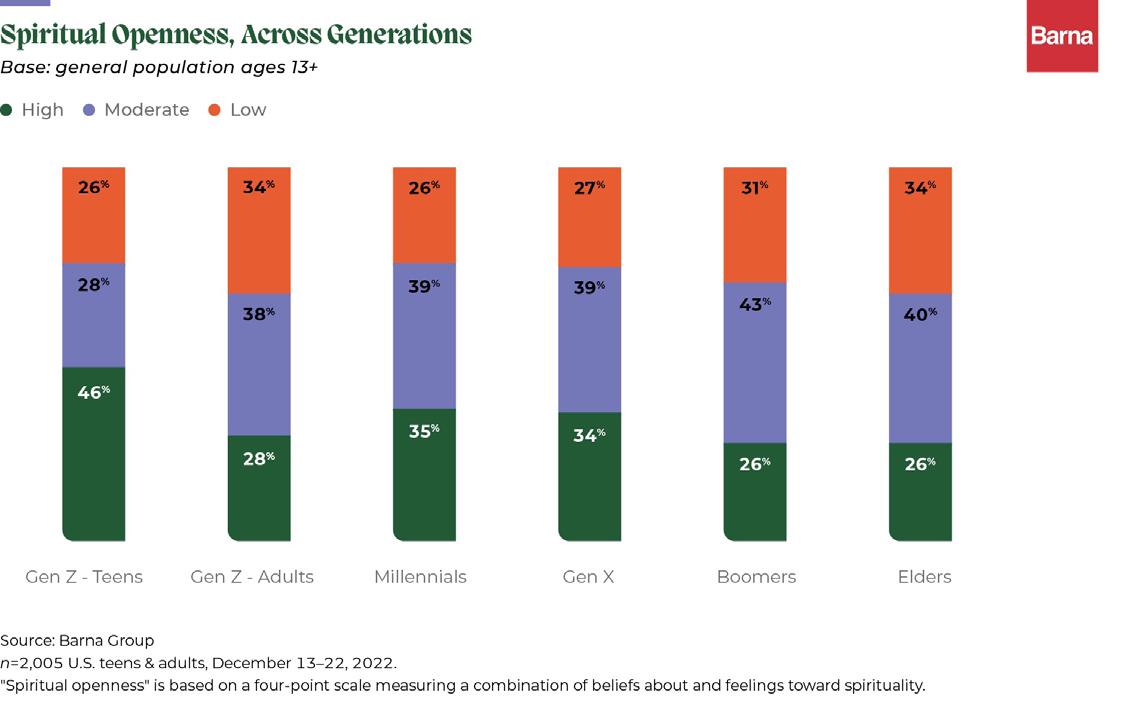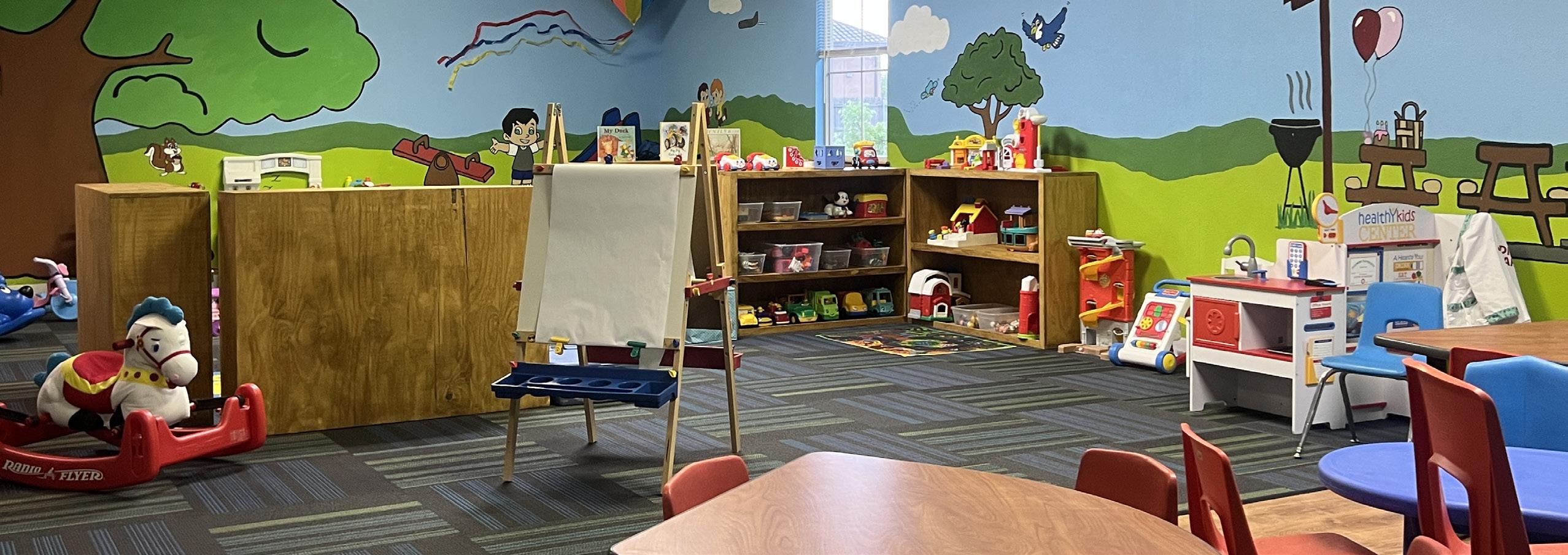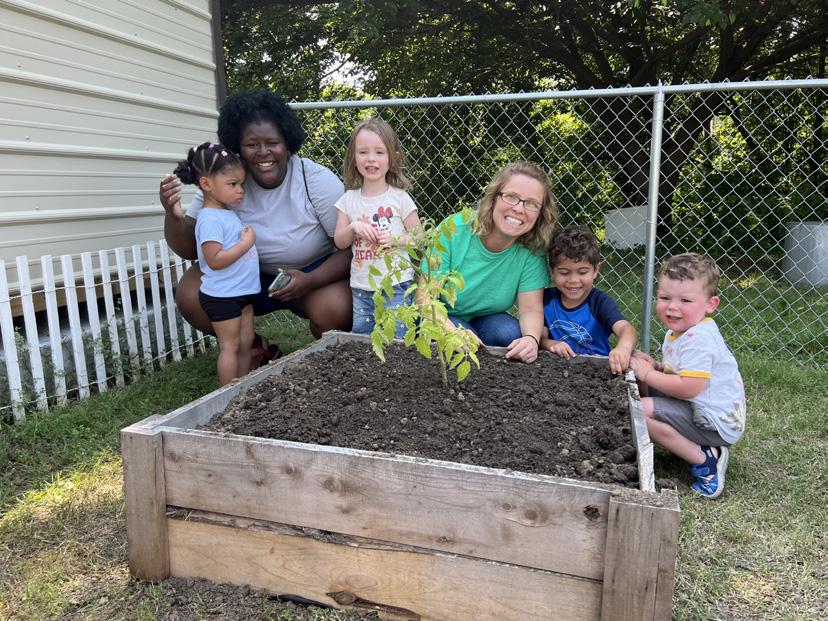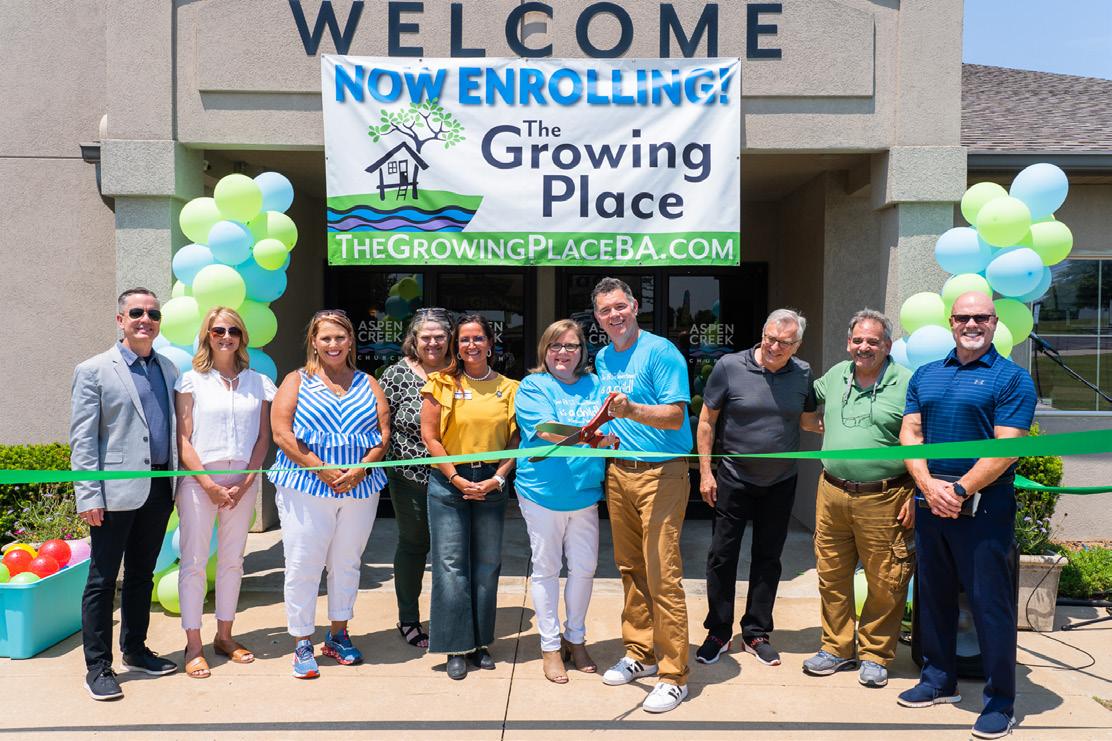Engaging the NEXT Generation





Oklahoma Assemblies of God

8701 N. Kelley Ave. Oklahoma City, OK 73131
The Oklahoma Outlook is published by the Oklahoma Assemblies of God.
Publisher: Dr. Darryl Wootton
Editor: Phil Taylor
Designers: Jayson Evans, Chris Ainsworth
Contributors:
Cynthia Dobbs, Josh Dryer, Elizabeth Moon, Cody Phillips, Jason Warnock, Darryl Wootton
www.okag.org

A Message from Our Pastor

Great white sharks have the potential to grow to 20 feet in length and 3500 pounds in weight in their natural habitat. However, marine biologists discovered that confined to a small aquarium, the same sharks would only reach 12 to 15 inches in length and weigh only 15-20 lbs.
The “Next Generation” is filled with supernatural potential. When I visit our children and youth ministry events, I am always encouraged by their passion for Christ. As leaders, are we providing big enough spiritual aquariums?
For decades, missiologists have suggested that over 85% of Christ followers accept Christ before age 18. Should we not invest our sharpest leaders and greatest resources into empowering this next generation? The evil one has launched an all-out attack on the identity of our students. In this attack, we must not simply be defensive. We must play offense. We must create big enough opportunities for the discipleship potential of our children and teenagers. Is your church providing ministry “aquariums?” Our students need worship, discipleship, fellowship, evangelism, and ministry opportunities.
Years ago, Faith and I were reflecting on our season in youth ministry. I was recalling youth ministry challenges. During our tenure at two different churches, several of our students were in and out of jail. In fact, one of our students will NEVER get out of jail. We can tell you many stories of fist fights, teenage pregnancies, a student setting another student on fire DURING youth service, youth leaders getting hit over the head with beer bottles, police intervention, heartbreaking court proceedings, and much more. We had given many years of our lives to nextgeneration ministry. In a weak moment, I asked Faith. “Was it worth it?”
Faith stopped me in my tracks and said, “You wait a minute.” She then began to reflect on students in our group who became missionaries to India, Nepal, Thailand, Europe, and Africa. She began to reflect on the many students in our group who became youth pastors and pastors. We tearfully remembered the students from our city’s impoverished areas with no religious faith in their families who now were following Jesus. We rejoiced in students who became Spirit-filled Deacons, Doctors, Teachers, and so much more.
These testimonies exist because we had a Lead Pastor, Phil Taylor, who gave our children’s and youth ministry a large spiritual aquarium. Our Pastor included students in the life of the church. They sat up front, participated in worship, served in outreaches, and grew to become warriors for God.

We have a decision to make. Will we limit our young sharks with small spiritual aquariums, or will we knock down the barriers and allow the next generation to step up and have a place at the ministry table? ENCOURAGEMENT is one of the biggest catalysts in seeing students reach their ministry potential. Students always initially feel inadequate. Who didn’t?
• Gideon told God, “I’m only the least in my family.” (Judges 6:15).
• Solomon told God: “I am only a little child” (1 Kings 3:7).
• The disciples, when told by Jesus to go feed the multitude, protested: “We only have five loaves and two fish.” It was a young boy who saved the day. (Matthew 14:17).
• Jeremiah said: “I am only a boy” (Jeremiah 1:6).
Encourage your children and youth. Encourage your children’s leaders and youth leaders. Encourage your nursery workers. Encourage your local public and private school teachers. Encourage the young sharks!
The church is the hope of the world, and the next generation is our only hope to pass on the heritage of Christianity. The next generation is the only option for our future. Without a successor, there is no success. We must encourage these young sharks.
Will you pray for the next generation? Will you encourage your children and youth leaders? Will you pray for our camps? Will you and your church believe in the next generation, invest in them, and love them even when they make mistakes? Where would you or I be without the encouragement of previous generations? Let’s pray for large spiritual aquariums. Let’s believe for big sharks.

July
Kids Camp #1
Kids Camp #2
Kids Camp #3
General Council & National Fine Arts
August
Girls Ministries Celebration
OSSOM Graduation
Century Leader Roundtable
OYM – STL Mud Run
September
Credential Deadline – Ordination
PK Retreat – Camp Cargill
Hispanic Women’s Conference
Daughter’s Conference
Sectional Tour
Sectional Tour
Main Event Men’s Conference
Sectional Tour
Sectional Tour
October
OSOM – OKC
Renew Ministers Retreat – Branson, MO
OSOM – Muskogee
OYM Youth Fest

OKNWM Seminar
November
Youth Pastors Retreat
OSOM – OKC
Seek and Save – OKC
OSOM – Muskogee
Century Leader Roundtable
P B & J Retreat
December
OSOM – OKC
Senior Heritage Christmas
OSOM – Muskogee
Missions Faith Promises Due
OYM Called Retreat
Ministerial Credentials Renewal Deadline
July 10-14
July 17-21
July 24-28
July 31 - August 4
August 12
August 19
August 24
August 26
September 1
September 2-4
September 8-9
September 15-16
September 18
September 18
September 21-23
September 25
September 26
October 7
October 9-11
October 14
October 13-14
October 21
November 2-3
November 4
November 7-11
November 11
November 16
November 17-18
December 2
December 2
December 9
December 15
December 27-29
December 31



Evidence discovered from the beginning to the end of God’s Word provides a framework for Christian families and communities to pass the faith to the next generation. Men and women of the Bible talked to their children about the great things God accomplished in the past as they looked forward to the future blessings of God. Sadly, throughout God’s Word, there are also examples of unfaithful people who did not adequately pass on their faith in God.
Deuteronomy, the last book written by Moses, illustrated the passing of an individual’s faith to the next generation. It commenced with Moses speaking to all of Israel about moving into the Promised Land. Deuteronomy provided the exact location and time (Deut. 1:1–5). This book of the Torah affirmed to the Israelites that God’s plan remained the best plan. God confirmed His faithfulness even in the midst of the peoples’ disobedience and wandering in the wilderness.
A new generation of Israelites saw their promised inheritance fulfilled by entering the land of Canaan. Deuteronomy 1:8 made this clear, “See, I have given you this land. Go in and take possession of the land the Lord swore he would give to your fathers—to Abraham, Isaac and Jacob—and to their descendants after them.” The children of God came to the end of wandering through the desert. Nevertheless, many in the current generation could not recall the first Passover, the Exodus, the crossing of the Red Sea, or God giving the Ten Commandments to Moses on Mount Sinai. God told Moses that he would not enter the Promised Land as stated in Numbers 20:12, “But the Lord said to Moses and Aaron, ‘Because you did not trust in me enough to honor me as holy in the sight of the Israelites, you will not bring this community into the land I give them.’” Moses began again to communicate about Israel’s history and God’s faithfulness to the people.
Moses recounted to the Israelites the faithfulness of God and the many ways God remained devoted to them. He shared how rebellion against God’s plan played an essential role in their parents and grandparents not getting to enter the Promised Land. Moses conveyed in Deuter-
onomy 1:26–27, “But you were unwilling to go up; you rebelled against the command of the Lord your God. You grumbled in your tents and said, ‘The Lord hates us, so he brought us out of Egypt to deliver us into the hands of the Amorites to destroy us.’” The generation that wandered through the desert desperately needed change. Moses continued to implore the children of God to understand their history so God could usher the Israelites to their future.
The book of Deuteronomy depicted Moses’ instructions to the Israelites. In his second address to God’s chosen people, in chapter 6, Moses shares a portion of Scripture known as the Shema. “Moses challenges them with his wisdom and warning because he doesn’t want these Israelites to repeat their parents’ mistakes. Rather, he invites them to respond to God’s grace and mercy with love, faithfulness, and obedience” (Mackie 2021). Shema is a Hebrew word which in the simplest of terms means “to hear.” However, according to Strong’s Concordance, it is better translated “to hear and obey” (“Strong’s Hebrew: 8086. שְׁמַע (Shema)—To Hear” 2021). God wanted the Hebrews to listen and do what He asked of them. He implored them to respond by listening and doing what He revealed through the covenant. “The Shema is the centerpiece of the daily morning and evening prayer services and is considered by some the most essential prayer in all of Judaism. An affirmation of God’s singularity and kingship, its daily recitation is regarded by traditionally observant Jews as a biblical commandment” (“The Shema My Jewish Learning” 2021). According to the Pentateuch, an individual must understand that God desired to establish His covenant with individuals, generation after generation. Over the centuries, the Shema prevailed as a battle cry of the Jewish people. “The little Jewish child learns to stammer them forth when first folding its tiny hands in prayer, while the dying son of Israel whispers them forth peacefully with his last breath” (Kohler 1919). The families of the Old Testament did not resemble the modern, western culture family. The Bible portrays a multigenerational structure.
The modern Western term “family” does not have an exact equivalent in the Old Testament, and the reason is that the two societies in question—modern Western and ancient Near Eastern—have different ways of defining kinship and social identity. The Hebrew term closest to “family” is bet äb, literally rendered as
The passing on of one’s faith should remain paramount in the Christian faith.
“father’s house,” reflecting a male-headed, multigenerational household as the basic kinship unit in ancient Israel. A household was shaped by endogamous marriage rites, patrilineal succession, and inheritance customs that privileged the eldest son, all practices which differ appreciably from their modern Western counterparts. (Dearman 1998)
The family unit proved crucial for the development of the nation of Israel. God set up the family to speak life into each generation and share with the next generation, thus fulfilling His plan for humanity.
The older generation taught the new or upcoming generation about the precepts of God through the Shema. Fathers utilized it as a prayer or teaching to their children. “At the same time the Sh’ma is most prominent in the Jewish liturgy and has come to play a special role in the personal experience of the individual. It is usually the first prayer one teaches one’s child and the last conscious utterance of a Jew before his death” (Spero 2020). God desired to reaffirm His covenant with the Hebrew people, not alter or change it. “This prayer has been one of the most influential traditions in Jewish history. The Shema has functioned both as the Jewish pledge of allegiance and a hymn of praise” (Mackie 2021). This new generation had to take to heart the concepts and laws God had for them.

In Canaan, many people groups served multiple gods. “From the beginning of the history of the Hebrews, idols were not only all around them; some Hebrews worshipped idols or approved altars for such worship” (Nelson 2006). God wanted the Israelites to know and understand the existence of only one true God. “The Shema is an affirmation of Judaism and a declaration of faith in one God” (“The Shema” 2021). A distinction of one true God remained imperative. The Israelites and Moses experienced a God that provided for all their physical needs and conducted miracles. God implored His people to refrain from idol worship in the land of Canaan. The Shema shaped and formed Judaism and the passing of faith from generation to generation. The framework of the family accomplished this goal.
The Book of Deuteronomy gave the world a fantastic depiction of what intergenerational faith was supposed to look like through the giving of the Shema to families. This helped the Israelites genuinely know who God was historically and through the covenant. Moses never saw the Promised Land due to his disobedience, yet, he gave a compelling argument for passing on one’s faith to the next generation at the end of his life. Moses declared in Deuteronomy 30:19-20, “This day I call the heavens and the earth as witnesses against you that I have set before
you life and death, blessings and curses. Now choose life, so that you and your children may live and that you may love the Lord your God, listen to his voice, and hold fast to him. For the Lord is your life, and he will give you many years in the land he swore to give to your fathers, Abraham, Isaac and Jacob.”
Moses reiterated to the Israelites that God would go before them and give them everything He promised. He told the Hebrews that what God had promised, He would perform for them in their midst based on the condition that His covenant was kept and taught to the next generation. Please be encouraged to share with your children and grandchildren the miracles and precepts of God. Pass on the stories of the Christian faith around the dinner table and the living rooms of your homes. Allow God’s guidance and faithfulness in your life to live on in the next generation!
Tell us a little about yourself.
I am a third-generation Assemblies of God minister. I came to know Christ and built a foundation of Biblical knowledge and service at Sand Springs First Assembly under Pastor Bill E. Weaver through church services, Children’s Church, Sunday School, and Royal Rangers. Kids camp, I-camp, and Youth camp played a vital role in shaping my life. On July 1, 1992, at Intermediate camp, I was baptized in the Holy Spirit and called into the ministry. I spent summers as a teenager working with Brother and Sister Salkil at I-camp and Kids camp.
For seven years, I had the privilege to work with the Fellowship of Christian Athletes. I was allowed on the public school campus as a missionary to share the love of Christ and saw hundreds of students come to know Him. This opportunity gave me a broader perspective on how to reach students.
I have served in many facets as a full-time church staff member. God has allowed me to serve as a lead, youth, children, and family pastor. All these positions have allowed me to love, serve, and train people from all walks of life.
Tell us a little about your family.
My family is my first and most important ministry; we serve alongside each other in ministry. I met my wife at Youth Camp in the summer of 1994 at Turner Falls. We married seven years to the day we met. I also took her back to camp to ask her to marry me at the exact spot we met by the old concessions stand. My wife, Sumer, has served as a part-time children’s pastor and
is a full-time sixth-grade teacher. We are blessed with ten children ages 1-31 – four biologically, four through adoption, and two through foster care. The heart of our family is to take care of the orphan in any way we can.

Five months into the job, what is your biggest takeaway?
My biggest takeaway is the need for relationships and community that we all desire. We need each other. During my first five months, I was able to participate in Sectional Councils, The Better Together Conference, state-wide church services, OCM events, etc. Throughout this time, the overwhelming value of relationships could not be denied. I am truly thankful for the Oklahoma Assemblies of God Network and excited to facilitate opportunities to build and foster new and existing connections. I do not want any pastor/minister to feel isolated or alone.
Oklahoma Children’s and Family Ministries exists to help churches embrace the mission of raising and discipling the next generation. We want to support local churches in the God-given assignment of reaching children and families by allowing them to utilize various camps, retreats, conferences, and connections with other children and family ministers.
Oklahoma Children’s and Family Ministries desires to inspire leaders to embrace the calling to disciple this generation, to lead families to a faithful commitment to God, and lead with love and loyalty as we strive for excellence.
We want to see kids’ lives changed forever. We do not want kids to merely have an experience but a true encounter with God. We want Kids Camp to be a place where students are given the opportunity to meet Jesus, be baptized in the Holy Spirit, called into the ministry, healed, and given hope for their future. We want the week they attend to be one of the best weeks of their lives.
generations before them (who had their own strengths) are insignificant to this generation.
Apart from the oxymoronic nature of her statement, the declaration from someone genuinely searching for truth suggests any truth was palatable. As our conversation progressed, I found her ideas about Christianity and witchcraft differing from ardent members of either persuasion. I invited her to a Chi Alpha Bible study. She gleefully accepted the invitation, letting me know she had been looking for a group with whom to investigate the Bible. My new friend is representative of this generation and its entry into circles of faith. They are inquisitive, spiritually open, and a rare breed that God has been waiting on for a long time. This generation is unattached to brands, denominations, material possessions, careers, and stability that generations before them craved. They are global vagabonds, akin to believers of the Way from the book of Acts, ready to move from town to town seeking new adventures, looking for new opportunities in places their parents or grandparents would never even think to look.
Suppose this generation, with its ingrained flexibility, were to possess the truth of the gospel of Jesus. In that case, they could reach every tribe, every tongue, and every nation more expediently than we have been able to thus far. The limitations of selling houses, uprooting families, and overcoming the discomfort of instability that hindered
In a chaotic culture, this new breed will be like John the Baptist crying in the wilderness of our postmodern, post-Christian landscape, preparing the way of the Lord. The question is, can we, the Church, embrace this generation and initiate them into their God-ordained destiny?
As I write, those in our youth groups and on our college campuses belong to Generation Z, also called Zoomers Unlike millennials whose disaffiliation from the Church stemmed from feelings of church hurt, Zoomers have no hurt since many have no experience with the Church. By and large, they are uninitiated to the life of the Church and, therefore, unengaged with the Church’s purpose, life, and function. Many Zoomers hold views about the Church borrowed from culture, all the while hoping for invitations to allow them to investigate the truth about Jesus on their own.
Traditionally church participation and entry have been tied to significant life events. Even non-churchgoers enter a church for a wedding, baptism, or other major life events. This route into a church is no longer a viable option for the younger generation. The later age of marriage and delayed progression of significant life events, due in large part to Gen Z’s contentment with not settling down, has kept them out of churches via these means . More than a third of Gen Z identify as religiously unaffiliated.
Recently I had a conversation with a young woman on an Oklahoma college campus who referred to herself as a Christian witch.

This lack of affiliation and an absence of strong family ties have left most Gen Z lonely and isolated.
A 2022 Barna study reported all generations across the board in the US are spiritually open. Leading this trend at 46% are Zoomers . This gives me great hope because the consequence of a generation without much religious history that is also very spiritually open is incredibly positive.

Here are three ways your church/ministry can be a place for this generation to find their way back to God.
While this may be a no-brainer, we still rely on mass marketing to present invitations to our communities. We must take the initiative to build individual relationships with members of this generation. A study done by Yahoo reports that Gen Z loses their attention span in an average of 1.3 seconds, much faster than any other generation before . Even if they pause to look, an inanimate advertisement, no matter how exciting, is a poor substitute for individual attention from a real person. God put us in a body because human souls need to be held, touched, and loved into the Kingdom. The low attention span of Gen Z is a gift to us in forcing us beyond lit screens into real conversations with people who are searching for the truth.
The Church may get nervous when it sees young people deconstructing faith, but recent studies report that Zoomers are deconstructing faith only to find their way back to true religion (James 1:27). The previous generation left the church largely due to their disappointment in religious systems that did not combat cultural injustices such as racism, sexism, and the like. But this generation is tearing things apart at the root to grasp from the debris Biblical truths to reconstruct faith as it should be. Gen Z is quite interested in social justice. Like the Father, their hearts are merciful toward the downtrodden and dispossessed. Many started out pursuing social justice for its own sake. This striving with little forward momentum has left many Gen Z heralds of change disenchanted. What an opportunity we have to connect the deep desire of their heart to heal the world with the power and purpose of the Healer.
Gen Z is actively and constantly searching for truth. In my experience as a college minister, I have seen firsthand how their search for truth ends with them running into “The Truth,” Jesus, who is waiting with loving arms to embrace them. As they have been searching for Him in the spiritual blindness of this world, we have the privilege of guiding them without goading them into truth.
The church has an excellent opportunity to engage this generation for the sake of the gospel. While some of yesteryear’s methodologies are needed for this re-engagement, we must rely on Spirit-led strategies to successfully present Zoomers an invitation into our family.
A common rebuttal to this suggestion is the lack of margin available to a minister to spend time with people outside of their public ministry. While time is precious for all of us, it is unwise to cut corners in a place that Jesus Himself refused to cut. He spent much of His earthly days in authentic relationships with Peter, James, and John, then the twelve disciples, followed by a circle of seventy. He trained those He spent time with to pursue others just like He pursued them with Kingdom love. If the Son of God chose to become flesh to dwell among us, how can we expect to achieve His kind of results by not dwelling among others?
Practically speaking, this does not require us to make fifty shallow relationships. Instead, consider one or two deep relationships where we ask questions and give answers to queries that Zoomers may have about faith. When inevitable erroneous thinking arises in these conversations, our relationship with them will help the credibility of our witness when we point them to Biblical truth that opposes cultural views even on hot-button topics like sexuality and social justice. Rules without a relationship present God as a tyrant. Rules with relationship establish Sonship/Daughterhood, for the Father only corrects those He loves, and so must we, in love, offer up correction. There is no substitute for this first and preeminent step of relationship forming in engaging this generation.
In a buffet of spiritual options that offer events of many kinds, we can stand out by offering the one thing that no other religious affiliation can: A family. Jesus did not come only to save us from our sins but to invite us into His family. Gen Z is apt to put off marriage like the millennials before them. Compound this with most of the generation growing up in fractured homes and divided
families, many feel alone, even in a crowd. Meanwhile, the fruit of the Kingdom is family!

When my son was five, he used to play with Legos. Some of my favorite memories with him are watching him tear a Lego building down so that he could build a new one all over again. He would invite me to play with him. My sole job was to offer him blocks. I would begin clumsily, not knowing what color or shape he wanted. But, as he built the first few parts, he would explain the shape of the building to me. Then, I was able to offer more accurate pieces that helped him build what he envisioned in his mind. In the safety of our relationship in the family’s living room, my son was free to deconstruct and reconstruct under his parent’s watchful and helpful eye.
This is how we can help Zoomers reconstruct correctly. If we become a safe place for them to belong, offering them the right building blocks when they find a gap in their theology, judging what they need anticipatively without passing judgment over their faults, we can be extenders of the hospitality of the Kingdom of God.
Hospitality is one of the best evangelistic tools in our toolbox. Our churches, cars, houses, and workplaces could become like the New Testament Pool of Bethesda, healing the soul wounds of everyone the moment they step in.
A 2018 study reported there are more witches in America than there are Presbyterians. The article startled me into reality and caused momentary trepidation in my heart over the future. I say momentary because soon, the Spirit of the Lord opened my eyes to the truth behind this statistic. I hope you notice that Gen Z is spiritually open. If the Church fails to offer it the supernatural, like my friend, the Christian witch, they will pursue any spirituality to satisfy their thirst.
In prior years, misunderstandings about Pentecostalism have caused more than a few of us to be nervous about welcoming moves of the Spirit in our gatherings. In so doing, we have played into the hands of our adversary. Abuse of the gifts has caused their disuse. The solution to misuse is not disuse but correct use. Paul himself addresses misuse by establishing decorum and protocol in 1 Corinthians.
In recent years I have seen more healings, miracles, deliverances, and Holy Spirit manifestations than ever before. When the enemy comes against us like a flood, the Lord raises a standard against Him. This standard is a beautiful resurgence of gifted, Spirit-filled believers who humbly push back the Kingdom of darkness with their radiant lights.
We must teach about the Holy Spirit, His fruit and gifts, and ready the family of God as God brings Zoomers
amongst us. While they see us seamlessly move from the natural to the supernatural, their quest for higher powers will end in submission to the highest power of them all. Like Simon the sorcerer from the book of Acts, many Zoomers have been attracted to Spirit-filled communities because of the signs and wonders they have heard about. But unlike Simon, they don’t have to leave empty-handed if we are willing to empower them with a relationship with the Father that will result in the indwelling of the Holy Spirit that will change the statistic of this generation from predominantly spiritually open to overwhelmingly Spirit filled.
It does not take a prophet to discern that we live in the last days. We must return to our Pentecostal fervor to reach the lost as we anticipate the Lord’s second coming. With everything in me I believe the Lord is preparing to send an awakening. The Church must be revived in mind, body, and spirit. Our thoughts about our world need to change from pessimism to Spirit-filled optimism. Our bodies must be revived out of the fatigue caused by standing up to a post-Christian and postmodern culture. We can be revived if we rest in the truth that God knows our days and has chosen us to be the message bearers for such a time as this. We are made for this, so our souls must be revived with hope for the future.
True, the Church is not mainstream anymore. But, the church was never meant to be mainstream. In Acts, frequent opposition and obstruction pushed the Church to the edges, finding common ground with the marginalized. The greater the oppression from culture, the larger the possibility for Kingdom expansion. Our unchanging God is the God of the new, the same as He is the God of the
old. He is looking to equip us with a Kingdom strategy to reach this generation and mobilize them as image-bearing message-bearers to places where the current Church cannot go. A possibility of having Acts 2 impact with all new methodologies is emerging. It is time we participate in this coming new revolution orchestrated by the hand of God.
Cynthia and her husband, Destry, live in Tulsa with their 17-year-old son Obadiah. They lead Tulsa Metro Chi Alpha. She is an award-winning writer and speaker who loves encouraging everyone to embrace their Kingdom identities. Cynthia also serves as the Director of the Network of Women Ministers for the Oklahoma Network.
• Cheryl Cran (2010) 101 Ways to Make Generations X, Y and Zoomers Happy at Work, ISBN, page 11: “The term “Zoomer” was coined by Canadian Moses Znaimer […] , well known for his contrarian views on aging and modern Baby Boomers.”
• https://www.americansurveycenter.org/research/generation-z-future-of-faith/
• https://www.barna.com/research/spiritual-openness/


• https://www.vice.com/en/article/pkd84b/gen-z-is-deconstructingreligion-and-finding-faith

• https://www.insiderintelligence.com/content/gen-z-has-1-secondattention-span-work-marketers-advantage

• https://www.newsweek.com/witchcraft-wiccans-mysticism-astrology-witches-millennials-pagans-religion-1221019



Why is creating a family discipleship model vital for today’s church?
The family is the primary model for disciple-making in scripture. We see this instruction in Deuteronomy 6:49: “Listen, Israel: The Lord our God, the Lord is one. 5 Love the Lord your God with all your heart, with all your soul, and with all your strength. 6 These words that I am giving you today are to be in your heart. 7 Repeat them to your children. Talk about them when you sit in your house and when you walk along the road, when you lie down and when you get up. 8 Bind them as a sign on your hand and let them be a symbol on your forehead. 9 Write them on the doorposts of your house and on your city gates.”
Throughout the narrative of scripture, especially in the Hebrew culture, the family was instrumental in spiritual formation and discipleship. As Pastors and ministry leaders, we must see it as our mandate to equip families for spiritual formation and discipleship in the home. The average church has only 40 hours in a given year to influence a child. In contrast, the average parent has over 3,000 hours per year to influence a child. Much of our time in planning for ministry and programming goes into the one to two hours we have a week with children and students. How much more effective could we be at disciple-making if we took time to plan for and resource families for at-home discipleship with the other 160 hours they have in a week? Before COVID-19,
we were seeing regular church attendance declining for families. Many said most families attend twice a month. Now, post-COVID-19, the average has dropped to once a month. This means we should take home-based discipleship even more seriously if we want to see kids, students, and families discipled and formed in the likeness of Christ.
Where are you seeing failures in the church’s ability to resource parents to disciple their children at home?
For generations, parents relied on the church to be their children’s main spiritual disciplers. The church created ministries and programs to make up for the lack of home discipleship. I believe this happened for two reasons. First, parents often feel ill-equipped to spiritually disciple their children. At the core of family discipleship is passing on faith to the next generation. Parents need to feel comfortable in their ability to disciple and spiritually feed themselves before they take the next step to lead their family spiritually. Most churches have not set up discipleship models that teach adults how to feed themselves spiritually. Churches need to think of ways to help parents feel comfortable and confident in carrying out the biblical mandate to pass on the faith to their children. Parents don’t need bible degrees, but they do need to be equipped and encouraged by the church to be disciple makers in their own home. Second, I believe there has been a lack of focus and financial investment in next-gen ministries. Kids and student
ministries don’t pay the bills. They require a longer ROI (return on investment), however, what a return on investment next-gen ministries provide. Statistics show most Christians become followers of Christ at a young age. If local churches become more strategic in planning and investing in the next generation, the return is lifelong followers of Jesus Christ and well worth the time and efforts.
How do parents respond to attempts to resource them to disciple children at home?
Most say they don’t have time or they are too busy. At home, discipleship takes intentionality—time, effort, planning, and patience. Often, discipleship takes the last place of importance behind food, clothing, education, and extracurricular activities. The other things are important, but they’re misaligned! As pastors and leaders, we must show and teach families how to properly prioritize and keep discipleship as a top priority in busy lives.
What are some key ingredients to build a system that properly develops the whole family spiritually?
Family discipleship must be viewed as an entire church strategy, not only a kids or youth ministry focus. Parents must be in the process of being discipled and encouraged from a senior level to pass on faith to their kids.
How can senior pastors encourage a family discipleship model?

Gather the leaders of the various ministries of the church and strategize on how best to consistently communicate the importance of home based discipleship in all areas of the church. Provide examples of when, where, and how discipleship can happen at home. Spell it out for parents, and give them a game plan! How can they take advantage of their time and redeem it for discipleship? Meal times, drive time, and bedtime are all great times every family has. Show parents how to do a few simple things to be strategic with those times. With an increased focus on family discipleship, numerous resources are available that churches can pass along to their families.
What are some elements you have seen as successful ways to build on family discipleship? What has worked, and what hasn’t worked?
Doing nothing will not work, 100% of the time. Start with a few families and ask them to help be a beta for the strategy you come up with. Have them use the weekly family devotions, family meal discussion questions, or whatever system you use. Ask them to share in
a service or in some other way with your congregation how it positively impacted their family. Sunday sermon series, Wednesday night teaching series, Saturday morning parent conference, weekly email or handouts from kids and student ministries sharing what they learned that week and how parents can reinforce it at home. What gets celebrated gets done. Champion family discipleship in your church and families will see the value.
What have you noticed in how the next generations pursue a relationship with God? Are these methods different from previous generations?
Personal encounters with Jesus can never be denied or forgotten. How are you and your church creating space for this to happen in next-gen ministries? Kids and students grow best in community and relationships. Small groups, discussion-driven learning, and hands-on participation are how kids and students comprehend more deeply. This engages the student and helps comprehension go further than lecture-based learning which is what most kids and student ministries have used in the past. Look at the teaching styles and methods schools in your community use and see how your church leadership team can learn from the technology, models, and strategies they use to engage kids and students of various ages.
If you were to help a church begin a family discipleship ministry today, where would you start?
Start with the senior pastor making it a priority. Have the pastoral staff or lay leaders strategize how your church can equip families to create time and moments in their schedule to have home-based discipleship. Find another church or ministry doing something you can learn from, ask questions, utilize resources already created to pass along to families. Remember, making disciples is our mandate and every church family can do something!
Josh Dryer and his wife, Lindsay, live in Edmond, OK, with their three kids; Nora, Zeke, and Halle. He serves as Family Life Pastor at Spring Creek AG in Edmond. They are passionate about disciple-making and spiritual formation in the home.

Bob and Sharla Roche have served in vocational ministry nationwide and currently pastor Aspen Creek Church in Broken Arrow, OK. What sets Aspen Creek apart is their mission to engage with their city. They recently had the grand opening of their daycare/preschool, The Growing Place.

When asked about the opening, Sharla responded, “We knew this was how to get into the community. God led us every step of the way through a long journey to this point.”
After graduating from Evangel College, Sharla spent time as the Director of Accounting at Southwestern Assemblies of God University. After getting married, Bob and Sharla stepped into vocational ministry and were on staff in Chicago, Oklahoma, California, New York, and then back to Chicago. They served in Chicago for ten years and on the Southside for 4.5 years. Sharla is a CPA and would often
help churches with their finances. She stated, “Our calling is to go into places and help churches, right the ship, create stability, and create health.” Their time in Chicago was some of the most formative years of their lives and time in ministry. During this time, they ran a daycare in a southside Chicago church, and Sharla oversaw the administration of it for nearly three years.
When they moved back to Oklahoma, the Roches put their children into public school after ten years of homeschooling. While delivering Christmas cookies to the teachers, the school’s principal offered Sharla a job. “I’ve been praying, and the Lord spoke to me and told me you’re supposed to be on my campus. I have a $9 an-hour aid position where you would primarily be grading papers and, in a sense, a full-time substitute grading papers.” After making the promise to pray about it, the Lord wouldn’t let Sharla get past it. Sharla reluctantly accepted the position but soon learned this was another door God was leading them through on their journey.
Eventually, Sharla was offered to teach not only one class, but over her 5-year stint she would end up teaching 13 different sections of classes. “I ended up teaching in that public school because you can get alternatively certified by taking tests, and because I’d homeschooled for ten
years, I could pass all these tests.” Despite her experience in administration, Sharla states that if it weren’t for the $9-an-hour job, the state of Oklahoma would not have permitted her to open The Growing Place. It was God’s way of qualifying the called. “Why would you take a $9-an-hour position” Sharla asks? “Because God is positioning you to make a difference in a generation.”
12 or 19 children, but they found out the need was as significant as getting 800 daycares opened across the whole state.
The Roches have spent the last two years working to get The Growing Place off the ground. Now Pastor Bob and Sharla are beginning to see how the daycare has affected their community and Aspen Creek Church. “It’s transformed our church. There’s energy in our church. Our church has grown, and our offerings have increased just because you have some energy and momentum going.”
People are seeing classrooms that were once serving as storage rooms filled with new life. Now they’re getting involved in the community. “People in the community are coming and touring our facility, and they’re finding out who we are. We just had the grand opening, and the city officials were there, and it’s been like this very life-giving thing.”
Bob and Sharla accepted the role of pastors of Aspen Creek Church in 2017. Sharla’s public school career led her to a position at Oral Roberts University. There she created a program that took students where they were in the high school setting and helped them to succeed on the college campus. Meanwhile, as pastors of Aspen Creek Church, they knew they had to engage their new community and not be in a church bubble. “We wanted to be out connecting with the community, connecting with the lost and bringing Jesus and [His] light to wherever we go in the marketplace.”
Since arriving at Aspen Creek, Pastors Bob and Sharla knew they needed to start a daycare. The church is located on the south end of Broken Arrow, “It’s now a growing area, and there’s no daycare.” From their previous experience in Chicago, they noticed that more than 80% of the kids who attended the daycare did not participate in church. They knew this was their opportunity to reach the people of Broken Arrow. Saying, “We need to do a daycare” and opening a daycare are two entirely different things, however, God had been giving them the skills, knowledge, and grace to pull it off all along the way. Despite being a self-proclaimed introvert, Sharla is always going, always trying to build something and create something. She just began working on the daycare. “The Lord just began to breathe life into it [as I ] started working on the daycare, working out what it was going to take, you know, facility wise, staff wise and everything, working toward that process.”
Throughout this process, they came to find out the need was massive, and the harvest was plentiful. There were a few daycares in Broken Arrow that were only licensed for


The story isn’t over yet for the Roche family. They dream of seeing every community with an Assembly of God Church have its own daycare. Sharla stated that there are four counties without even one daycare center right now. But how do you receive DHS licensing without sacrificing your Christian witness and values? How do you create the policies, procedures, and staff manuals that are true to the Church and to who we are as Christians, but still walk in excellence and do things that will be attractive to parents and that align with licensing with the state?
The Roches have spent thousands of hours praying and creating answers to these questions and want to help as many churches as possible. “This has been the biggest tool to reaching our community, and God has been faithful the entire time.”
Cody Phillips has been in ministry for over ten years and has served in many different roles. Currently, he and his wife, Lindsay, are serving as Executive Campus Pastors at The Bridge Bricktown in Oklahoma City.



Thank
Garrett Boren garret112@gmail.com
MC
Kirk & Karla Ford kirk@nexusministries.org
Chris & Amy Hales halesforeurope@gmail.com
TH
Daniel & Janene Hazelrigg hazelrigg.d@gmail.com
Bethany Hines bethany.hines524@gmail.com
Cory & Angela Hogan Hogansinmexico@gmail.com
Rebekah & Scott Howell rhowell@backyardorphans.org
A.J Jenkins aj.jenkins@agwmafrica.org
SL
Joni Middleton jonimiddleton@gmail.com
Adam & Sarah Quinn ouquinn@gmail.com
David & Patricia Schatzmann dave@schatzmann.com
Isiah Smith iamisiahsmith@gmail.com
JS
Stephen & Kimberly Snow sk3ksnowfamily@gmail.com
Micheal & Jaylynn Sperry sperry1232@gmail.com
Thailand
**Sensitive Country
Nexus Ministries/Church Planting in Europe
Europe
Intercultural Ministries, Sensitive
Mexico, Latin America/Caribbean
Latin America Caribbean
Mexico, Latin America/Caribbean
Orphan Care
Mozambique
**Sensitive Country
France, Europe, Project Rescue
Latin America Caribbean
Pohnapei, Asia Pacific
Netherlands, Europe
**Sensitive Country
Intercultural Ministries, Hispanic
We are grateful to the Oklahoma Network for supporting Next Gen ministry through Girls Ministries. Gender-specific ministry recognizes and embraces the unique needs, experiences, and potential of girls and young women. Drawing upon the biblical principle of Titus 2, Girls Clubs create a nurturing environment where older women can pass on their wisdom, guidance, and encouragement to the next generation.
offer training, and help churches with Girls Clubs or want to get started. The Girls Ministries Celebration each August provides an opportunity to present awards for Honor Star (5th grade), Friends Graduates (8th grade), Girls Only Graduates (seniors), and Medals of Honor. Oklahoma has the highest number of Honor Stars in the nation! Even though we offer achievement, discipleship is our number one goal.
Young ladies are celebrated for their unique gifts, their voices are heard and valued, and they are equipped to become compassionate leaders who are change-makers. Through these intentional relationships and Biblical teachings, girls are empowered to grow in faith, develop strong character, and navigate challenges. Today more than ever, girls need us pouring into their lives.
Girls Clubs in the local church provide weekly fellowship, discipleship, achievement, and a place to grow. Throughout the state, we have Girls Specialists who plan events,

Looking back at the rich history of Oklahoma Girls Ministries, we see a tapestry woven with countless stories of our young women finding their purpose and using their God-given gifts for His kingdom—all thanks to the godly women who have invested in the lives of Oklahoma girls. We are filled with excitement and hope as we step into the future. Through gender-specific ministry, we are shaping a future that reflects God’s deep love and purpose for every girl. Together, let us embrace the Titus 2 principle and reach the next generation and build a future where girls are empowered, cherished, and equipped to impact their communities and world for God.

Total Graduates: 2013–2022
Honor Stars
893 Friends Graduates (6th-8th grades)


38 Girls Only Graduates (graduating seniors)
110
Thursday, Nov 9

Men’s Basketball Game
Halftime Alumni Recognitions
Friday, Nov 10
Homecoming Chapel

Young Alumnus Award Winners
Celebration Banquet
Saturday, Nov 11
Tailgate Party
Homecoming Football Game
Early Bird pricing through Sept. 11, 2023


For tickets, hotel reservations and full schedule go to: www.sagu.edu/homecoming
For more info contact: alumni@sagu.edu . 972-825-4639


A network of Churches and a family of Ministers focused on fulfilling the Great Commission
We
